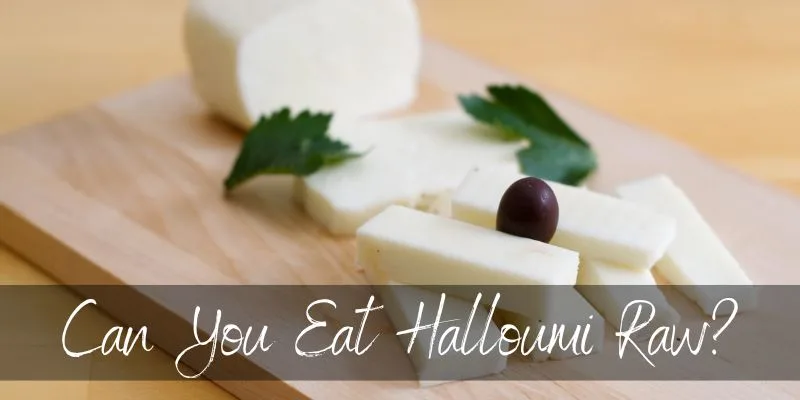The first time when we had halloumi was in Cyprus. “Of Course”, halloumi is the most popular cheese in Cyprus since it is one of their signature food. But we never had it raw, so it’s ok if you ask yourself if you can eat raw halloumi without cooking it.
Since then, we have had halloumi quite often. Since we are not so far from Greece and Cyprus, halloumi has become pretty popular in Romania. However, when you say something about halloumi, everybody will say,” Ah, yea, that cheese that you have to grill”. So, I decided to make an article about eating it raw. I had it raw, but I wasn’t checking online if it is safe or if you are supposed to eat it raw.
In this article, I will let you know my opinion about eating raw halloumi, what to expect from its taste and texture and what are the best pairings for raw halloumi, so stick with me.

Can you eat halloumi raw?
Halloumi is the most popular grilled cheese out there. However, you can eat raw halloumi since it is like any other cheese with a high melting point.
Halloumi is not eaten raw so often because grilled halloumi works in almost any recipe that you would like to use raw halloumi. For example, if you want to make a salad, you can use grilled halloumi. At breakfast, cheese is usually eaten without cooking, but grilled halloumi works again. So in order to eat raw halloumi, you really have to want it and swap the grilled one for it. That’s why it is not so popular, not that it is not safe to eat it raw or anything like that.
The taste of raw halloumi is another thing that makes people go for the cooked one, it is not so different, but the cooked one is not as salty. Halloumi is usually a salty cheese, and cooking it reduces a bit of its saltiness. Otherwise, if you are ok with the salty, tangy taste that halloumi has, you should be ok eating it raw as well.
The texture of raw halloumi is kind of squeaky and a bit annoying, and cooking it will help dry it out a bit. I found eating raw halloumi funny since it has a squeaky, springy texture and will make a funny sound like scratching a sponge on the window.
In my experience, eating raw halloumi is ok, but I would not eat large quantities of raw halloumi since the salty, tangy taste and the squaky texture will be off-putting quite easily. So, you can try it, but don’t expect to substitute the grilled halloumi with raw halloumi forever.
What to pair with raw halloumi?
I will let you know a few good uses for raw halloumi and what to pair it with. As I said before, cooked halloumi will also work in most recipes and pairings.
Greek-style charcuterie board. Fresh halloumi generally works with other fresh ingredients and less with the cooked ones, making it perfect for a charcuterie board. I noticed that some greek-style charcuterie boards don’t use as many fruits but adding some grapes, figs, forest fruits, or watermelon will help a lot.
Watermelon and raw halloumi. I know watermelon with cheese is quite popular in the U.S., but to be honest, I never tried it, but I keep saying that I will; maybe writing this article will push me a bit. Watermelon works great with many fresh kinds of cheese, so halloumi makes no exception to this combination.
Veggie wrap with halloumi. In this case, I would prefer cooked halloumi, but if you are in a hurry to go to work or you don’t have the option to cook it, veggie wrap with raw halloumi will do it for you. We recently had halloumi veggie wrap, which means wrap with some vegetables like lettuce, spinach, cucumber, tomato, and halloumi, served with fried sweet potatoes, and it was delicious. You must try this.
Halloumi Greek salad. Raw halloumi can be a great substitute for feta cheese in the greek salad. I will not go into more detail about how to make it since this can be an entirely different article, but here you can find a recipe for halloumi greek salad.
Cyprus Breakfast. Cyprus breakfast is known for the grilled halloumi cheese, but if you want to try it raw, you can go for it.

How to know if halloumi has gone bad?
When eating raw or cooked halloumi is important to use good, fresh halloumi.
I will give you a few things to check before eating halloumi in order to make sure everything is fine and your halloumi is good to eat.
-Color. Fresh halloumi has a uniform white or light cream color, so if your halloumi has changed its color and has weird spots, you can throw it away.
-Mold Appearance. Most people will tell you if you see any mold spots, you can cut them off and continue to eat the cheese, but the presence of mold means that there are bacteria that most likely found a way into the middle of the cheese as well, so it is not as safe as many people think it is.
-Smell. If you notice a sour and off-putting smell instead of the fresh salty-smelling cheese, you should get rid of that halloumi as fast as you can.
-Taste. We already talked about how raw halloumi is supposed to taste, but if somehow all you notice is spoiled milk taste, it’s a sign that the halloumi has gone bad.
-Texture. The texture of fresh halloumi is a bit soft and squeaky; when it goes bad, it will be dry and crumbly.
Make sure you check all these signs before eating halloumi, raw or cooked, it doesn’t matter, you must make sure that the halloumi is fresh.
Read Also: Why Is Olive Oil Bitter?
Conclusion
In conclusion, we found out that halloumi is totally safe to be eaten raw, it can be annoying due to its texture and taste, but it is edible.
I hope this article helped you know what to expect from eating raw halloumi and what you can do with it.

